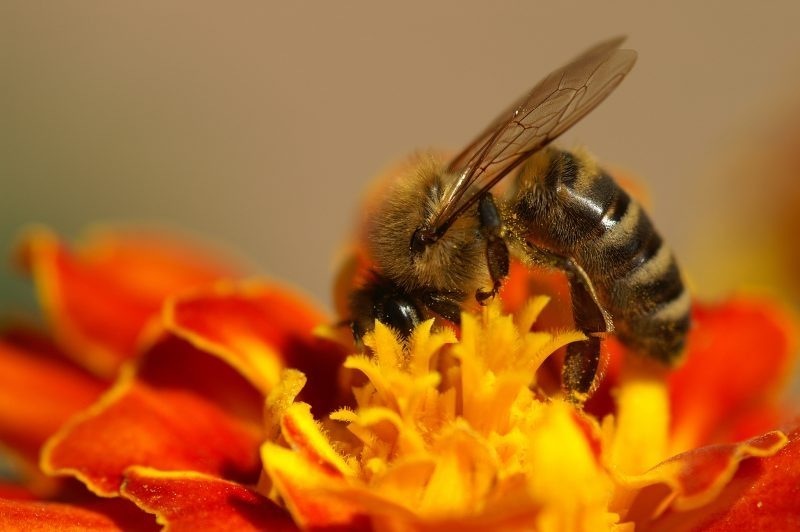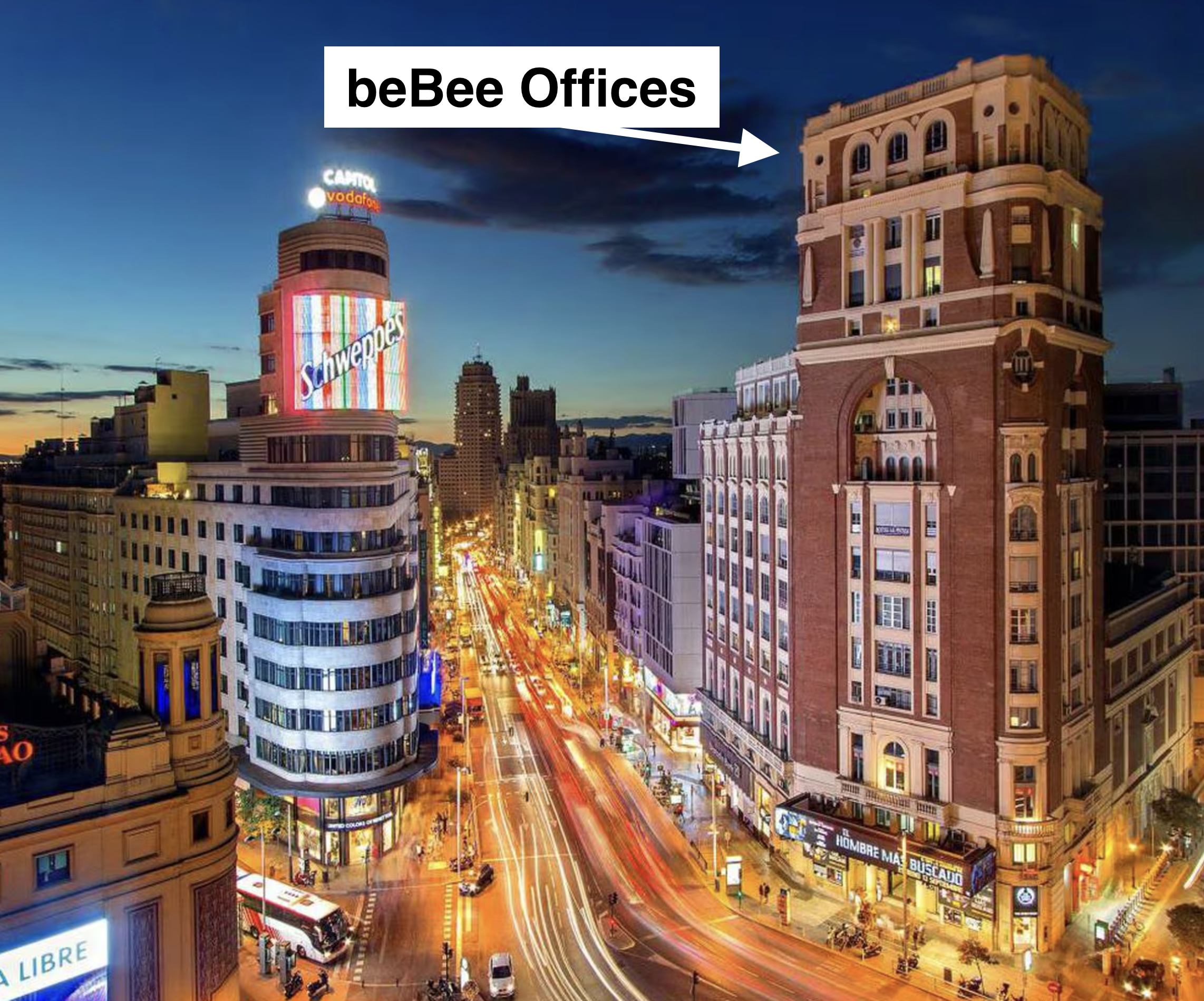Save the bees / Salvemos a las abejas
Save the Bees

Be the solution to help protect bees in crisis.
Believe it or not, you have a bee to thank for every one in three bites of food you eat.
Honey bees—wild and domestic—perform about 80 percent of all pollination worldwide. A single bee colony can pollinate 300 million flowers each day. Grains are primarily pollinated by the wind, but fruits, nuts and vegetables are pollinated by bees. Seventy out of the top 100 human food crops—which supply about 90 percent of the world’s nutrition—are pollinated by bees.
“In the last four years, the chemical industry has spent $11.2 million on a PR initiative to say it’s not their fault, so we know whose fault it is.”
Jon Cooksey, writer, director, How to Boil a Frog.
What’s Killing the Bees—And Why It Matters
Worldwide bee colony collapse is not as big a mystery as the chemical industry claims.
The systemic nature of the problem makes it complex, but not impenetrable. Scientists know that bees are dying from a variety of factors—pesticides, drought, habitat destruction, nutrition deficit, air pollution, global warming and more. Many of these causes are interrelated. The bottom line is that we know humans are largely responsible for the two most prominent causes: pesticides and habitat loss.
Worker bees (females) live about six weeks in summer and several months in the winter. Colonies produce new worker bees continuously during the spring and summer, and then reproduction slows during the winter. Typically, a bee hive or colony will decline by 5-10 percent over the winter, and replace those lost bees in the spring. In a bad year, a bee colony might lose 15-20 percent of its bees.
In the U.S., winter losses have commonly reached 30-50 percent, in some cases more. In 2006, David Hackenberg—a bee keeper for 42 years—reported a 90 percent die-off among his 3,000 hives. U.S. National Agricultural Statistics show a honey bee decline from about 6 million hives in 1947 to 2.4 million hives in 2008, a 60 percent reduction.
The number of working bee colonies per hectare provides a critical metric of crop health. In the U.S.—among crops that require bee pollination—the number of bee colonies per hectare has declined by 90 percent since 1962. The bees cannot keep pace with the winter die-off rates and habitat loss.
Pesticides & Bees
Biologists have found more than 150 different chemical residues in bee pollen, a deadly “pesticide cocktail” according to University of California apiculturist Eric Mussen. The chemical companies Bayer, Syngenta, BASF, Dow, DuPont and Monsanto shrug their shoulders at the systemic complexity, as if the mystery were too complicated. They advocate no change in pesticide policy. After all, selling poisons to the world’s farmers is profitable.
Furthermore, wild bee habitat shrinks every year as industrial agribusiness converts grasslands and forest into mono-culture farms, which are then contaminated with pesticides. To reverse the world bee decline, we need to fix our dysfunctional and destructive agricultural system.
Solutions That Save the Bees
Common sense actions can restore and protect the world’s bees. Here’s a strong start:
- Ban the seven most dangerous pesticides.
- Protect pollinator health by preserving wild habitat.
- Restore ecological agriculture.
Ecological farming is the overarching new policy trend that will stabilize human food production, preserve wild habitats, and protect the bees. The nation of Bhutan has led the world in adopting a 100 percent organic farming policy. Mexico has banned genetically modified corn to protect its native corn varieties. Eight European countries have banned genetically modified crops and Hungary has burned more than 1,000 acres of corn contaminated with genetically modified varieties. In India, scientist Vandana Shiva and a network of small farmers have built an organic farming resistance to industrial agriculture over two decades.
Ecological, organic farming is nothing new. It is the way most farming has been done throughout human history. Ecological farming resists insect damage by avoiding large monocrops and preserving ecosystem diversity. Ecological farming restores soil nutrients with natural composting systems, avoids soil loss from wind and water erosion, and avoids pesticides and chemical fertilisers.
By restoring bee populations and healthier bees, ecological agriculture improves pollination, which in turn improves crop yields. Ecological farming takes advantage of the natural ecosystem services, water filtration, pollination, oxygen production, and disease and pest control.
Organic farmers have advocated better research and funding by industry, government, farmers, and the public to develop organic farming techniques, improve food production, and maintain ecological health. The revolution in farming would promote equitable diets around the world and support crops primarily for human consumption, avoiding crops for animal food and biofuels.
What the U.S. Can Learn From Europe About Saving the Bees
In Europe, Asia and South America, the annual bee die-off lags behind the U.S. decline, but the trend is clear and the response has been more appropriate. In Europe, Rabobank reported that annual European die-offs have reached 30-35 percent and that the colonies-per-hectare count is down 25 percent.
A European Food Safety Authority (EFSA) scientific report determined that three widely used pesticides—nicotine-based clothianidin, imidacloprid and thiametoxam—pose “high acute risks” for bees. The nicotinoid pesticides—used in soils, on foliage, and embedded in seeds—persist at the core of the toxic pesticide cocktail found in bee hives.
A Greenpeace scientific report identifies seven priority bee-killer pesticides—including the three nicotine culprits—plus clorpyriphos, cypermethrin, deltamethrin, and fipronil. The three neonicotinoids act on insect nervous systems. They accumulate in individual bees and within entire colonies, including the honey that bees feed to infant larvae. Bees that do not die outright, experience sub-lethal systemic effects, development defects, weakness, and loss of orientation. The die-off leaves fewer bees and weaker bees, who must work harder to produce honey in depleted wild habitats. These conditions create the nightmare formula for bee colony collapse.
Bayer makes and markets imidacloprid and clothianidin; Syngenta produces thiamethoxam. In 2009, the world market for these three toxins reached more than $2 billion. Syngenta, Bayer, Dow, Monsanto, and DuPont control nearly 100% of the world market for genetically modified pesticides, plants and seeds.
In 2012, a German court criminally charged Syngenta with perjury for concealing its own report showing that its genetically modified corn had killed livestock. In the U.S., the company paid out $105 million to settle a class-action lawsuit for contaminating the drinking water for over 50 million citizens with its “gender-bending” herbicide Atrazine. Now, these corporate polluters are waging multi-million-euro campaigns to deny responsibility for bee colony collapse.
In May, the European Commission responded, adopting a two-year ban on the three necotinoid pesticides, and later added the non-neonicotinoid fibronil. Scientists will use the two years to assess the recovery rate of the bees and a longer-term ban on these and other pesticides.
Meanwhile, the U.S. dithers and supports the corporations that produce and market the deadly pesticides. The U.S. Environmental Protection Agency (EPA) continues to allow the use of neonicotinoid pesticides, in spite of a U.S. Department of Agriculture report warning about the dangers of the bee colony collapse.
Also in 2014, President Obama signed the now infamous “Monsanto Protection Act”—written by Monsanto lobbyists—that gives biotech companies immunity in federal U.S. courts from damages to people and the environment caused by their commercial compounds.
Bee Venom Kills HIV: Nanoparticles Carrying Toxin Shown To Destroy Human Immunodeficiency Virus (VIDEO)
Bees in decline
Without insect pollination, about one third of the crops we eat would have to be pollinated by other means, or they would produce significantly less food. Up to 75% of our crops would suffer some decrease in productivity. Undoubtedly, the most nutritious and interesting crops in our diet – including many key fruits and vegetables, together with some crops used as fodder in meat and dairy production – would be badly affected by a decline in insect pollinators. In particular, the production of apples, strawberries, tomatoes and almonds would suffer.
Beside crop plants, most wild plants (about 90% of them) need animal-mediated pollination to reproduce, and thus other ecosystem services and the wild habitats providing them also depend, directly or indirectly, on insect pollinators.
Bees and other pollinators – both in the wild, and managed – seem to be declining globally, particularly in North America and Europe. In recent winters, honeybee colony mortality in Europe has averaged around 20%.
No single factor can be blamed for the overall global decline in bee populations, or in their overall health. This decline is undoubtedly the product of multiple factors, both known and unknown, acting singly or in combination. Nonetheless, the most important factors affecting pollinator health relate to disease and parasites, and to wider industrial agricultural practices that affect many other aspects of a bee's life cycle. Underlying all the other factors, climate change is also putting increased strains on pollinator health.
Some pesticides pose direct risk to pollinators. The elimination of bee-harming chemicals from agriculture is a crucial and most-effective first step to protect the health of bee populations.
Salvemos a las abejas
La polinización de las flores es vital para nuestra alimentación y para la biodiversidad, pero las abejas, unas de las principales encargadas de esta misión, están desapareciendo. Entre otros factores, mueren por la agricultura industrial y su uso de plaguicidas tóxicos. Es urgente, por lo tanto, cambiar el modelo de la agricultura industrial por una agricultura ecológica.
#SOSabejas
Las abejas son mucho más importantes de lo que pensamos. La producción de alimentos a nivel mundial y la biodiversidad terrestre dependen en gran medida de la polinización, un proceso natural que permite que se fecunden las flores y den así frutos y semillas. Las abejas, y otros insectos como mariposas y abejorros, son los responsables de este proceso y, sin embargo, sus poblaciones están disminuyendo a pasos de gigante.
Varios son los factores que amenazan a los polinizadores: la pérdida de hábitats, las prácticas de la agricultura industrializada, como los monocultivos (menor disponibilidad y diversidad de alimento para estos insectos), el uso de plaguicidas; parásitos y enfermedades; especies vegetales y animales invasoras; y los impactos del cambio climático. Se ha calculado que el valor económico de la labor de polinización de las abejas podría estar en torno a los 265.000 millones de euros anuales en todo el mundo, 22.000 millones para Europa y más de 2.400 millones de euros para España, recientemente calculado por Greenpeace en su informe "Alimentos bajo amenaza" Así pues, incluso desde un punto de vista puramente económico, merece la pena proteger a las abejas.
Las cifras del problema que sufren los polinizadores son contundentes. El informe “El declive de las abejas” advierte que las poblaciones de abejas disminuyeron en Europa un 25% entre 1985 y 2005. Pero también otras especies están padeciendo la misma suerte. Datos recientes revelaron que el 46% de las 68 especies de abejorros europeos están en declive y 24% en peligro de extinción. También las mariposas. En las dos últimas décadas se han reducido a la mitad las poblaciones de mariposas de las praderas, según la Agencia Europea de Medio Ambiente.
Por su parte, la Organización de las Naciones Unidas para la Agricultura y la Alimentación (FAO por sus siglas en inglés) ha mostrado en el informe “UNEP Emerging Issues” que el declive de las abejas está ocurriendo en todo el mundo y que el resto de polinizadores están en la misma situación. De hecho, las recientes restricciones en la UE a cuatro insecticidas se basan en recientes evidencias científicas que confirman la nocividad de estos productos para las abejas. Además, laAutoridad Europea de Seguridad Alimentaria (EFSA, por sus siglas en inglés) ha expresado sus preocupaciones respecto a dos plaguicidas neonicotinoides, puesto que podrían afectar también el desarrollo del sistema nervioso de los seres humanos.
¿Qué soluciones hay?
Si los cambios que pedimos no ocurren podríamos asistir a un declive irreversible de las poblaciones de insectos polinizadores, lo que implicaría una pérdida de productividad de la gran mayoría de cultivos (en Europa el 84% de 264 cultivos dependen de la polinización por insectos) e incluso la inviabilidad de otros. Esto supondría un incremento del precio de los cultivos que se pudiesen mantener y un cambio en la pirámide alimentaria. Podríamos polinizar a mano algunos cultivos con un interés comercial importante… pero, ¿quién va a polinizar el romero, tomillo, zarzamoras, arándanos y un largo etcétera?
Por tanto es imprescindible aplicar soluciones. El primer paso es prohibir los productos tóxicos para las abejas actualmente en uso, y hacer que la evaluación de riesgos de los plaguicidas sea mucho más estricta. Por otro lado, deben ponerse en marcha planes integrales de acción para salvar a las abejas. Y la solución definitiva es la adopción de la agricultura ecológica como única vía para una producción sostenible.
Este cambio lo pueden iniciar los políticos, apostando por un modelo de agricultura ecológica y legislando en consonancia; los agricultores, cambiando sus prácticas de cultivo; y las empresas, desarrollando líneas de productos y técnicas ecológicas. Y, por supuesto, también personas como tú, demandando productos ecológicos.
El veneno de abeja podría ser utilizado para destruir el VIH
============================================================================
What is beBee?
beBee is the next big thing in professional social networking.
Our mission is to create a professional world that is more open and connected.
beBee is disrupting professional social networking by establishing connections through passions and common interests that create more professional engagement and deeper and more successful business relationships.
¿ Qué es beBee ?
Las conexiones a través de aficiones e intereses en común, crean más participación y actividad profesional, y relaciones de negocio más profundas y exitosas.
Artículos de Javier Cámara-Rica 🐝🇪🇸
Ver blog
Generar ingresos a partir de un portal de empleo puede ser una tarea abrumadora, sobre todo si se co ...

In a blog post, a representative from Microsoft, provides an update on the progress of the new AI-po ...

Madrid is establishing itself as a formidable competitor on the European economic scene, challenging ...
Profesionales relacionados
Puede que te interesen estos puestos de trabajo
-

Captador/A Socios Ong Save The Children L-V Mañana
Encontrado en: Buscojobs ES C2 - hace 3 días
Momentum Task Force Sevilla, España¿Te interesan las causas sociales y quieres que tu trabajo tenga un impacto positivo en el mundo?Desarrolla tu carrera profesional con SAVE THE CHILDREN y trabaja con nosotros de LUNES a VIERNES de 10:00 a 14:00 h. Solo necesitas INICIATIVA, GANAS Y ACTITUD para empezar a trabaja ...
-

Jefe/A Equipo Save The Children
Encontrado en: Buscojobs ES C2 - hace 1 semana
Momentum Task Force Sevilla, España¿Quieres liderar un equipo de captadores/as de socios en una las ONGs más importantes del mundo?Desde Momentum Task Force, empresa líder en el sector comercial y promocional, estamos buscando un Jefe/a de Equipo para Save The Children en Sevilla que marque la diferencia. Te ofrec ...
-

Terapia de pareja por mi pareja falta madurar y no save educar a su hija
Encontrado en: Cronoshare ES C2 - hace 4 días
Cronoshare Alcoi/Alcoy (Alacant/Alicante), EspañaMi pareja y yo llevamos 5 años juntos y estamos en una situación muy grave hemos llegado a ablar incluso con abogados de divorcio¿Cuál es la duración de la relación? · Entre 2 y 5 años · ¿Qué problemas hay en la relación? · Mi pareja falta madurar y no save educar asu hija · ¿Ran ...

Comentarios
CityVP Manjit
hace 5 años #7
Candice 🐝 Galek
hace 5 años #6
Javier Cámara-Rica 🐝🇪🇸
hace 5 años #5
Fernando 🐝 Santa Isabel Llanos
hace 7 años #4
Maria Merino
hace 7 años #3
Mamen 🐝 Delgado
hace 7 años #2
Miguel López de la Oliva
hace 7 años #1